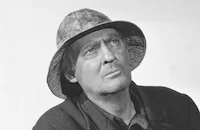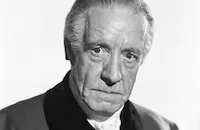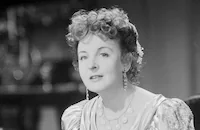Looking Forward

Brief Synopsis
Cast & Crew
Clarence Brown
Lionel Barrymore
Lewis Stone
Benita Hume
Elizabeth Allen
Phillips Holmes
Film Details
Technical Specs

Synopsis
Beset with severe financial problems brought on by the Depression, London department store owner Gabriel Service bows to the pressure of his two partners and fires many of his employees, including Benton, a forty-year veteran of the accounting department. Although stunned, Benton meekly accepts his dismissal and Service's assessment that he lacks the necessary "push" to be useful to the store and tells his struggling family that his boss had no choice but to let him go. At the same time, Service confronts his daughter Caroline and her stepmother Isabel about their spending habits and tells them that the family fortune is quickly dwindling. When faced with Service's announcement that their large house will have to be sold to save the store, the adulterous Isabel coolly informs her husband that she will be seeking a divorce if he chooses his business over her comfort. While genuinely concerned about her father's well-being, Caroline refuses to accept his assessment of their finances and insists that they keep the house. The next day, Service and his partners discuss a buy-out offer, which has just been made by their main competitor, Stoner's, a store whose business ethics Service deplores. Although saddened by the thought of selling out to Stoner's, Service verbally accepts the offer and that night announces to Caroline that he is going to sacrifice the store to satisfy the family's needs. An apologetic Caroline, however, tells her father that Isabel has already left with another man. Then, while rumors of the Stoner buy-out circulate around London, Benton, who has started a small but successful pastry business with his wife and two children, worries about his former boss. In spite of his family's gentle ridicule, Benton takes some of his wife Lil's meat pastries to a cemetery near the Service store and patiently waits for Service to pass. Service, meanwhile, is confronted by Caroline and his son Michael, who has just returned from Europe, about the buy out. After Michael shows Service drawings of furniture that he had hoped to build and sell at the store, Caroline, who is in love with her father's secretary, insists that, with their combined dedication, the shop can be saved. Although moved by his children's unexpected loyalty, Service refuses to back out of the deal and leaves to sign Stoner's agreement papers. On the way, however, he meets Benton in the cemetery and listens as his former employee passionately describes the Depression as the World War I of the present and begs him to allow his children to fight for the store's future. After Benton convinces him not to sell out, Service returns to Michael and Caroline with the good news and agrees that the Bentons' delicious pastries should be sold in their store.

Director

Clarence Brown
Cast

Lionel Barrymore

Lewis Stone

Benita Hume

Elizabeth Allen

Phillips Holmes

Colin Clive

Alec B. Francis

Doris Lloyd

Halliwell Hobbes

Douglas Walton
Viva Tattersall

Lawrence Grant
George K. Arthur

Charles Irwin

Billy Bevan

Eily Malyon
Rita Carlyle
Marion Clayton
Crew

Film Details
Technical Specs

Articles
Looking Forward
Production began on the film in late February 1933 at Metro-Goldwyn-Mayer under the auspices of Cosmopolitan Productions, W.R. Hearst's production company created for Marion Davies at the MGM lot. The working titles of the film were Service, Yesterday's Rich and The New Deal, no doubt to capitalize on the recent election of Roosevelt. The final title Looking Forward is further connected to the President by the inclusion of a quote from the book in the foreword that appears onscreen, "We need enthusiasm, imagination and ability to face fact we need the courage of the young."
The storyline was a typical 1930s morality tale: Gabriel Service (Lewis Stone), a wealthy store owner, has fallen on hard times and is forced to sell the store founded by his grandfather to meet the extravagant spending of his family. Longtime employee Benton, now unemployed, creates a successful pastry business for himself. When he learns the store is to be sold, Benton takes some of his pies to the local cemetery to intercept Service on his walk home to try to convince him not to sell. All ends happily as only an MGM film could.
Variety noted the timeliness of the production, "This unassuming human exposition of present-day economic relationships cant help but find a parallel in the existence of almost every picture-house patron. [] A well-nigh flawless cast does handily by every aspect of the cinematurgy. Barrymore and Stone are tops in the male assignments. Benita Hume as the disloyal stepmother and Elizabeth Allan and Phillips Holmes as the youngsters, handle the other principal assignments well. Colin Clive is also prominent and effective."
Producer: Clarence Brown
Director: Clarence Brown
Screenplay: Bess Meredyth; H.M. Harwood; Dodie Smith (play, as C.L. Anthony)
Cinematography: Oliver T. Marsh
Art Direction: Cedric Gibbons
Music: William Axt (uncredited)
Film Editing: Hugh Wynn
Cast: Lionel Barrymore (Tim Benton), Lewis Stone (Gabriel Service, Sr.), Benita Hume (Mrs. Isobel Service), Elizabeth Allan (Caroline Service), Phillips Holmes (Michael Service), Colin Clive (Geoffrey Fielding), Alec B. Francis (Mr. Birkenshaw), Doris Lloyd (Mrs. Lil Benton), Halliwell Hobbes (Mr. James Felton), Douglas Walton (Willie Benton), Viva Tattersall (Miss Elsie Benton), Lawrence Grant (Philip Bendicott), George K. Arthur (Mr. Tressitt - Salesman).
BW-82m.
by Lorraine LoBianco
SOURCES:
The American Film Institute Catalog
Variety Film Review, April 28, 1933
The Internet Movie Database

Looking Forward
Quotes
Trivia
The original play opened on 12 October 1932 in London, England, UK.
The title of the movie was taken from the book written by President Franklin Delano Roosevelt and credited to him onscreen.
Notes
The working titles of this film were Service, Yesterday's Rich and The New Deal. Motion Picture Herald reviewed the film as The New Deal. The following quotation from Franklin D. Roosevelt's 1933 book Looking Forward, which the filmmakers acknowledge as the source of the film's title, appears in an onscreen foreword: "We need enthusiasm, imagination and ability to face facts-we need the courage of the young." Variety notes that Harry Rapf's onscreen associate producer credit was a "departure on the Metro lot."















